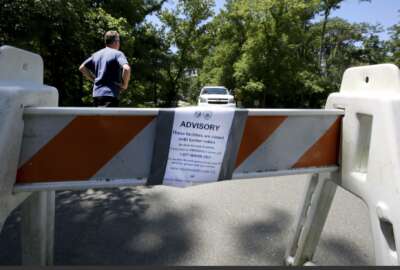
Democratic lawmakers renew back pay push for low-wage contractors
Federal contractors have never been made whole by Congress in the aftermath of a government shutdown, but a coalition of Democratic lawmakers have redouble...
Unlike federal employees, government contractors have never received back pay in the aftermath of a government shutdown, but a coalition of Democratic lawmakers has redoubled its efforts Tuesday to see that change.
The renewed effort to ensure contract workers receive back pay — particularly low-wage service employees like custodians, security guards and cafeteria workers — follows a push from House lawmakers to ensure federal employees receive a retroactive 2.6 percent pay raise, effective Jan. 1.
“Why should these hard-working people be forced to pay the price of the shutdown themselves? We think that’s wrong, and we’re working to fix it,” Sen. Tina Smith (D-Minn.) said on Capitol Hill, joined by federal contract workers represented by the Service Employees International Union.
The bill Smith co-sponsored earlier this month would provide back pay to low-wage service contract employees impacted by the shutdown through a process known as “equitable adjustment” to ensure federal contractors can provide back pay to their employees.
“That means that contracts can be modified when there are changed conditions. Surely a shutdown qualifies as a changed condition,” said Del. Eleanor Holmes Norton (D-D.C.), who has introduced contractor back-pay bills during this shutdown and previous ones.
Last week, President Donald Trump signed a continuing resolution keeping shuttered agencies open until Feb. 15.
Sen. Chris Van Hollen (D-Md.) said House and Senate lawmakers should include the contractor back-pay provision in a comprehensive spending bill.
“We’re all going to work very hard to make sure that when we keep the government open three weeks from now, in that same bill we provide this legislation to make sure that service contractor employees are made whole,” Van Hollen said.
However, Lila Johnson, a custodian who’s cleaned Agriculture Department buildings for 21 years, said the threat of another government shutdown has only provided more uncertainty about the future of her next paycheck.
“Even when I go back to work, it could be March before I even get a decent check,” Johnson said.
Federal employees impacted by the partial government shutdown can generally expect to get paid for the two missed pay periods before the end of January. But Johnson said her coworkers have never received financial assistance following a shutdown.
De’Von Russell, a security guard at the Smithsonian Natural History Museum, said he faces many of the same debts as federal employees — credit card bills, rent and car insurance — but he has yet to receive any back pay from a shutdown.
“We’re basically doing the same jobs they’re doing, so what is the difference here?” Russell said.
Norton said contract employees currently fill many roles that were previously held by federal employees, but often with lower salaries and fewer benefits.
“We have no right to save money by depriving employees who were kept from going to work, or who went to work and lost wages,” she said.
The bill introduced by Smith caps reimbursement for contract employees making $50,000 or less a year — equivalent to 200 percent of the federal poverty line.
“How many people up here make $50,000?” Smith asked.
None of the SEIU employees raised their hands. A few laughed.
“These folks would get 100 percent of their lost wages,” she added.
Copyright © 2024 Federal News Network. All rights reserved. This website is not intended for users located within the European Economic Area.
Jory Heckman is a reporter at Federal News Network covering U.S. Postal Service, IRS, big data and technology issues.
Follow @jheckmanWFED
Related Stories





